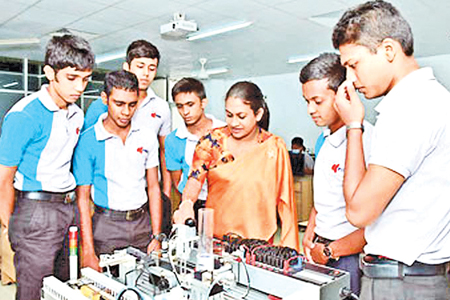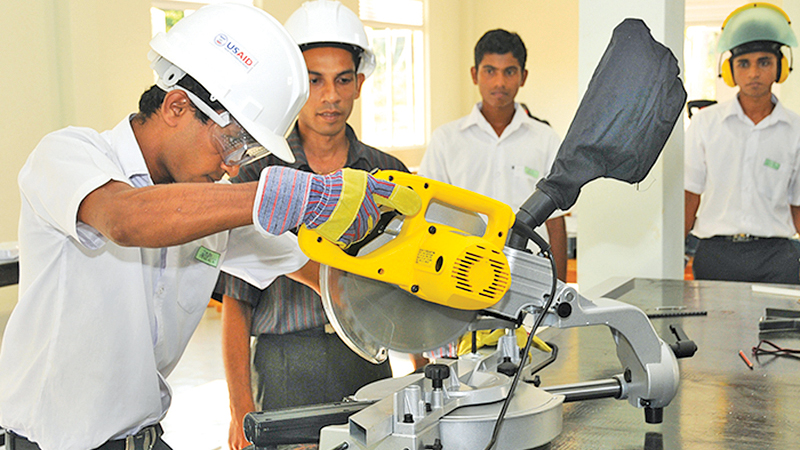 There are many shortcomings in our education system, but one of the main complaints is the lack of opportunities for students to learn various skills such as electronics repair and motor mechanism. This means that those who are unable to gain higher education opportunities after the GCE Ordinary Level and Advanced Level examinations are often left in the lurch. But if they are equipped with the right skills in a variety of fields, jobs are available both locally and overseas.
There are many shortcomings in our education system, but one of the main complaints is the lack of opportunities for students to learn various skills such as electronics repair and motor mechanism. This means that those who are unable to gain higher education opportunities after the GCE Ordinary Level and Advanced Level examinations are often left in the lurch. But if they are equipped with the right skills in a variety of fields, jobs are available both locally and overseas.
Technological advancements and shifting labour market dynamics increasingly call for agile and adaptable skill sets. It is crucial that Governments empower young people to navigate these changes effectively. Technical and Vocational Education and Training (TVET) is well placed to meet these demands by reducing access barriers to the world of work, ensuring that skills gained are relevant, recognised and certified, promoting green skills and practices, and offering skills development opportunities for youth who are not in education, employment and training.
Failures in the System
Unfortunately, the existing education systems are failing to address the learning needs of many young people. In this context, skills and jobs for youth feature prominently in the 2030 UN Agenda for Sustainable Development. Recent estimates suggest that 600 million jobs would have to be created over the next 15 years to meet youth employment needs.
Today, there are 1.2 billion young people aged 15 to 24 years, accounting for 16 percent of the global population. By 2030—the target date for the Sustainable Development Goals (SDGs) that make up the 2030 Agenda—the number of youth is projected to have grown by 7 percent, to nearly 1.3 billion.
The total global number of unemployed youth is estimated to reach 73 million this year, a slight improvement from 2021 (75 million) but still six million above the pre-pandemic level of 2019. The youth population will grow by more than 80 million between 2021 and 2030. Low income countries will account for nearly half of that increase.
Education and training systems need to respond to this challenge. According to the UN, an additional 8.4 million jobs for young people could be created by 2030 through the implementation of Green and Blue policy measures, which Sri Lanka is also pursuing under the Green Economy agenda.
Sustainable development efforts
The active engagement of youth in sustainable development efforts is central to achieving sustainable, inclusive and stable societies and averting the worst threats and challenges to sustainable development, including the impacts of Climate Change, unemployment, poverty, gender inequality, conflict, and migration. But rising youth unemployment is a significant problem facing economies and societies.
 Global surveys suggest that both employers and youth consider that many graduates are ill-prepared for the world of work. This is especially so in Sri Lanka, where many graduates have not followed courses that have any relevance to job market requirements. There is nothing inherently wrong in following Arts and Humanities courses, but jobs are hard to come by in that field. In many countries, the informal sector and traditional rural sector remain a major source of employment but these jobs are not assured.
Global surveys suggest that both employers and youth consider that many graduates are ill-prepared for the world of work. This is especially so in Sri Lanka, where many graduates have not followed courses that have any relevance to job market requirements. There is nothing inherently wrong in following Arts and Humanities courses, but jobs are hard to come by in that field. In many countries, the informal sector and traditional rural sector remain a major source of employment but these jobs are not assured.
The number of workers in vulnerable employment currently stands at 1.44 billion worldwide, which was exacerbated by the pandemic. One in four young people in the world cannot find jobs paying more than US$ 1.25 per day, the international threshold of extreme poverty. Again, it comes down to the available skills or the lack thereof.
Males are more likely to find employment than females, even in the unskilled categories such as manual labour. And even when they find employment, their wages are almost always lower than those paid to men. In fact, it will take around 180 more years to achieve gender parity in salary terms, according to the UN.
More vulnerable
Young people are almost three times more likely to be unemployed than adults and are continuously exposed to lower quality of jobs, greater labour market inequalities, and longer and more insecure school-to-work transitions. In addition, women are more likely to be underemployed and under-paid, and to undertake part-time jobs or work under temporary contracts. One reason for youth unemployment, which affects all regions around the world, is a mismatch between the skills workers can offer and the skills which are in demand. This is known as structural unemployment. This is prevalent in Sri Lanka as well. If you glance through the vacancies sections of this newspaper, thousands of jobs are advertised, but some ads are repeated week after week, apparently because the employers cannot find suitable job takers. In other words, many people in the job market do not have the particular set of skills that the employers need.
There should be focus on skills development among both young males and females. The latter should be encouraged to venture into the more male dominated sectors such as motor mechanism/car repair, heavy vehicle/earthmoving equipment operations, welding and air-conditioning.
Males too should be encouraged to take up sewing/tailoring, cookery and other vocations. Sri Lanka already has a good structure for vocational training, with technical colleges around the island and a central Vocational Training Authority (VTA). There is a national NVQ (National Vocational Qualification) certification system accepted by most countries.
Lack of Vocational Training
The problem in Sri Lanka is not essentially the lack of vocational training opportunities. The main issue is that every student tries to enter a State university, which is impossible given that only around 30,000 State university openings are available annually. This means almost 100,000 students who do have the required admission qualifications cannot enter universities, whereby a large number of students end up without getting any sort of job-oriented education.
This is one major problem that our educationists and law makers should address. Our curricula must be aligned with the needs of the job market for students to find jobs easily. For example, the aviation sector will have thousands of job openings for pilots, cabin crew, Maintenance, Repair and Overhaul (MRO), ground handling, Air Traffic Control (ATC) and customer service over the next decade. There is no focus at all on such fields in our school and university education system. Worse, several vocational subjects were removed from the curricula some time back, the repercussions of which we still experience. This should be rectified without delay.
Another key issue is that the informal workforce (such as masons, carpenters, painters) has had no formal training and depends on skills acquired by informal means. This translates into lower wages and career uncertainty. Thus it is always better to acquire formal vocational training. In Sri Lanka, a mason or carpenter may have several Golayas (pupils or assistants) who learn the trade under him, but they have no certificates or formal qualifications. This may prove problematic if they apply for jobs at well-known construction companies here or abroad which generally require formal training certification.
Unemployment and poverty are two social evils. If youth including girls are skillful, they will get jobs and become self-reliant and many problems in society would be solved. Gainfully employed youth will also not turn to drugs, vice and crime. Parents and teachers should encourage students who display a talent for skills and subjects other than textbook studies. If a youngster displays a knack for a mechanical-oriented subject, let him or her continue. If she or he is forced to give it up, that could be a loss to the economy one day.
The school is the obvious place to start job hunting. There are three approaches – vocational subjects, education fairs and job fairs. Vocational subjects should be taught to all students, irrespective of whether they would eventually take to a vocation. Education fairs obviously focus on higher educational opportunities here and abroad, other than the State universities. By participating in these fairs, students gain an idea of what skills and qualifications are needed to find a job.
In Sri Lanka, it is virtually difficult to find a job that does not require a good knowledge of English. This is indeed why some private companies prefer school-leavers who can speak good English over university graduates who are not very fluent in the language. The university students must abandon their “Kaduwa” (Sword) mentality when it comes to English.
English, though not essentially a vocational subject, must be taught to all aspiring job seekers. There is a trend among youth to go overseas for studies or jobs, both of which require a god command of English. Sri Lanka must also improve its STEM (Science, Technology, Engineering and Mathematics) education especially for girls. Our policymakers as well as the youth must be aware of two more challenges – Artificial Intelligence (AI), automation/robotics and digitalisation.
These trends are likely to take some skilled jobs away within the next few years and decades. Recently, a well-known Australian bank closed all of its physical branches to become a fully digital-based bank. Such trends will be inevitable in the coming years.
The key is to identify sectors where automation or digitalisation would not make much of a difference even in the future. Not everything can be done by AI and robots. We will still need a human touch in most vocations. Skills are not necessarily only for youth. One can learn certain skills at any age. Singapore has a program called SkillsFuture which people at any stage of their life can access to gain a new skill.
According to the SkillsFuture website, the programs “enable individuals to learn for life, pursue skills mastery and develop fulfilling careers, for a future-ready Singapore”. We need a similar initiative in Sri Lanka too, so that we have a segment of the population equipped with the right skills for meeting the exacting demands of the future.




